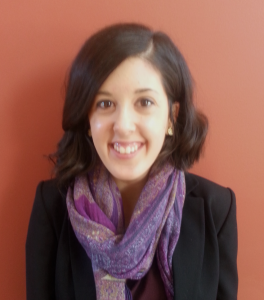 Kara Vasil, Class of 2016
Kara Vasil, Class of 2016
The University of Akron/NOAC
Picture this: You are in the sound booth, right in the middle of an audiologic assessment. A few missed head turns or latent ABR waves in, you realize that maybe these parents’ fear has been realized, and their child has a hearing loss. They’ve sat in your office, putting the puzzle pieces together of the child’s birth history, medical complications, and behaviors in the home. You now have concrete evidence, in the form of behavioral testing, an ABR, OAE’s, or whatever it may be. Now it is time to break the news to these parents that their child has a hearing impairment. Whether they are expecting it or not, you, the audiologist, have a job to do.
Despite coursework in pediatrics, counseling, and aural rehabilitation, many graduate student clinicians have never been in this situation. Even when evaluating pediatric patients of all ages and walks of life, the majority have not yet concretely identified and reported to parents a permanent, sensorineural hearing loss. As many clinicians would agree, I do not believe this is a skill that can be taught solely in the classroom. Some may feel that there has been a barrier between the clinician and the parent – what is appropriate to say, and what are these parents thinking about when they leave the office and return home with their child?
Learning from the True Experts
This past semester, that barrier crumbled a bit. In a pediatric amplification course, my professor, Dr. Mark Krumm, brought in four parents of children with hearing loss. These parents were all from the local area and had met in a support group. Their children had sensorineural hearing loss of varying degrees and were treated with hearing aids and cochlear implants, technology that I consider myself quite familiar with. However, one thing I do know is that it’s not about the technology. Hearing these parents’ testimonials about their relationships with their audiologists, their children, and their families was a truly eye-opening experience. The experience reminded my entire class that the parents of our pediatric patients are trying their best and have heartfelt compassion for their kids, and, no surprise – they know their children a whole lot better than we do. These parents know what makes their children tick, they know what the technology will and will not accomplish in their home, and they also probably know their audiologist’s cell phone number for when they will inevitably need it.
The parents who visited my class talked about the desire for a trusting, collaborative relationship with their audiologist, with referral to the appropriate professionals when we just don’t have all of the answers. An article published in the American Journal of Audiology confirmed these statements; parents and caregivers want their voices to be heard, and they want their child’s treatment implemented in a coordinated and professional manner. Fitzpatrick, et al. (2008) interviewed 21 parents about the strengths and weaknesses of the standard audiologic care system. Although most parents were satisfied with the range of services provided and the quality of services, they did have a few suggestions for us to consider. Family-centered care and a high level of support have been linked with higher rates of follow-up, better participation in early intervention services, and ultimately improved outcomes for the child.
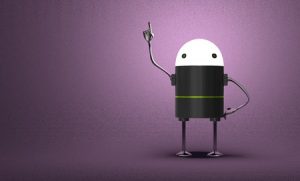 Two Things Click
Two Things Click
After listening to these parents on that otherwise-average Wednesday, two insights have stuck with me.
- The clinician leaves the office at the end of the day and may not communicate with the family until the appointment nears. In the meantime, parents, family member and caregivers spend most waking hours with the child every day! And those hours can be “messy.” Children and their parents need breaks from the technology sometimes. They will likely lose a hearing aid or two. Earmolds will need to be remade routinely. Children get sick, teeth, and have bad days, which impacts amplification use. Families need their audiologist to provide not only information, but empathy for those challenges.
- One mother became emotional while talking to our class. She reported that, yes, hearing aids do sometimes get wet, and children do sometimes get hurt while playing sports. But what kind of childhood would their son or daughter have if they were kept from participating in all of the activities that they loved? Gymnastics, swimming, volleyball, horseback riding, and simply playing in the backyard are all activities that typically hearing children participate in; why should a child with hearing aids or cochlear implants behave any differently?
If we as audiologists can recognize a family’s unique needs, we can ensure the child obtain not only access to all of the necessary auditory stimuli but also access to healthcare professionals, educators, and other families. If and when problems do arise, they will become that much easier to solve when the family-audiologist relationship is built on mutual trust and understanding.
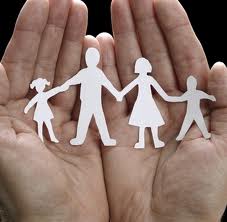
Reference
Fitzpatrick, E., Angus, D., Durieux-Smith, A., Graham, I.D., & Coyle, D. (2008). Parents’ needs following identification of childhood hearing loss. American Journal of Audiology, 17, 38-49.

 Laura Rickey, Class of 2017
Laura Rickey, Class of 2017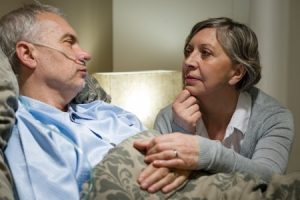
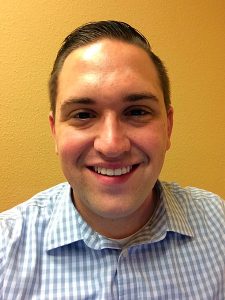 Peter Huchinson, Class of 2016
Peter Huchinson, Class of 2016 Providing patient-centered care is something that sounds appealing and makes logical sense, but often I find difficult to practice. When I see a moderate, sloping, high frequency hearing loss, I think about the hearing aid I will recommend at the end of the appointment. When a patient complains of dizziness upon getting out of bed, I consider BPPV. These initial thoughts are natural, and there is nothing wrong to start thinking about the issue at hand and the recommendation that I will make. The problem is that I often find myself stopping there. I forget to consider the needs and desires of that particular patient. I forget to consider the patient’s activity limitations, participation restrictions, and perceived or experienced stigma. I forget to consider the emotional journey that the patient has been on for much longer than the last 30 minutes that they have been in my sound booth.
Providing patient-centered care is something that sounds appealing and makes logical sense, but often I find difficult to practice. When I see a moderate, sloping, high frequency hearing loss, I think about the hearing aid I will recommend at the end of the appointment. When a patient complains of dizziness upon getting out of bed, I consider BPPV. These initial thoughts are natural, and there is nothing wrong to start thinking about the issue at hand and the recommendation that I will make. The problem is that I often find myself stopping there. I forget to consider the needs and desires of that particular patient. I forget to consider the patient’s activity limitations, participation restrictions, and perceived or experienced stigma. I forget to consider the emotional journey that the patient has been on for much longer than the last 30 minutes that they have been in my sound booth.
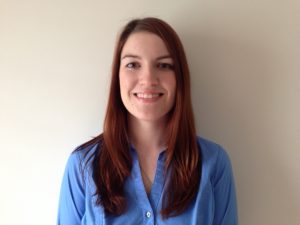 Chelsea Twyman, Class of 2016
Chelsea Twyman, Class of 2016 Recently, I attended a support group for patients with cochlear implants (CI) and their significant others. The patients at this support group all had difficulty with two or more of the categories discussed above. Usually, this support group splits into two subgroups — one for CI users and one for their communication partners, to chat separately before coming together near the end of the session. On the day I visited, attendance was small due to the weather, so the group stayed together the entire meeting.
Recently, I attended a support group for patients with cochlear implants (CI) and their significant others. The patients at this support group all had difficulty with two or more of the categories discussed above. Usually, this support group splits into two subgroups — one for CI users and one for their communication partners, to chat separately before coming together near the end of the session. On the day I visited, attendance was small due to the weather, so the group stayed together the entire meeting. 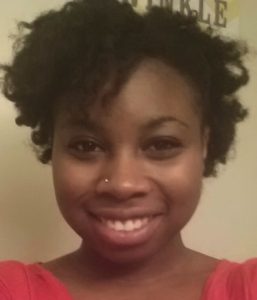 Chanel Rogers, Class of 2017
Chanel Rogers, Class of 2017![photo[1]](https://advancingaudcounseling.com/wp-content/uploads/2016/05/photo1-300x300.jpg) Nicolle Yopa, Class of 2015
Nicolle Yopa, Class of 2015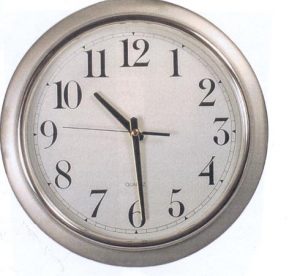 because John had class. We told her we had planned on an hour because many important things needed to be discussed; regardless, they opted to cut the appointment short so that John could make the last 20 minutes of class. My supervisor reluctantly agreed to let John leave with the hearing aids and have his parents practice with him at home.
because John had class. We told her we had planned on an hour because many important things needed to be discussed; regardless, they opted to cut the appointment short so that John could make the last 20 minutes of class. My supervisor reluctantly agreed to let John leave with the hearing aids and have his parents practice with him at home.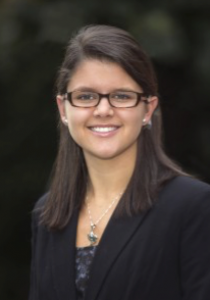 Alison Marinelli, Class of 2018 (AuD/PhD)
Alison Marinelli, Class of 2018 (AuD/PhD)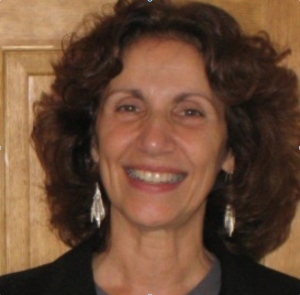
 Emily Pajevic, Class of 2015
Emily Pajevic, Class of 2015 How does an audiologist best serve Amanda and other adolescent patients? We cannot continue to primarily address the parents, undermining the patient’s knowledge and concern for his/her own healthcare and yet cannot ignore the parent’s need for understanding and the crucial role that they play. In healthcare, as well as our own profession, this topic of interacting with adolescents needs to be explored. If the unknown prevents us from providing the best care to this patient population, it is time to delve into this uncharted area, further expanding our knowledge and understanding to enhance our field and our impact on those we serve.
How does an audiologist best serve Amanda and other adolescent patients? We cannot continue to primarily address the parents, undermining the patient’s knowledge and concern for his/her own healthcare and yet cannot ignore the parent’s need for understanding and the crucial role that they play. In healthcare, as well as our own profession, this topic of interacting with adolescents needs to be explored. If the unknown prevents us from providing the best care to this patient population, it is time to delve into this uncharted area, further expanding our knowledge and understanding to enhance our field and our impact on those we serve. 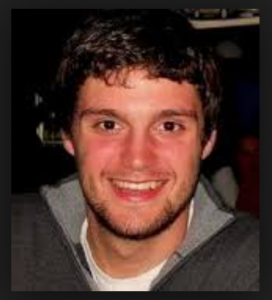 Michael Squires, Class of 2014
Michael Squires, Class of 2014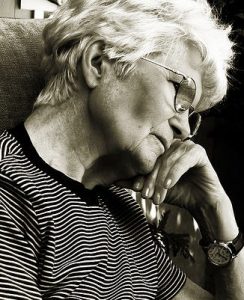 What went wrong? It is obvious that this appointment had come to a point where an audiologist was no longer able to help. Unfortunately, this patient was never referred to anyone who could. There are many instances when a patient in an audiological setting should be referred to another professional for further examination. However, there is one such instance that is consistently ignored; depression. It seems intuitive that any major life changes, including learning of one’s hearing loss, has the potential to cause symptoms of depression. Audiologists are many times the first to notice depression and stress caused or exacerbated by a hearing loss. Yet, when these signs are noticed, whether they are caused by news of a hearing loss or some other event, what is the next step for an audiologist? According to the American Academy of Audiology’s Code of Ethics:
What went wrong? It is obvious that this appointment had come to a point where an audiologist was no longer able to help. Unfortunately, this patient was never referred to anyone who could. There are many instances when a patient in an audiological setting should be referred to another professional for further examination. However, there is one such instance that is consistently ignored; depression. It seems intuitive that any major life changes, including learning of one’s hearing loss, has the potential to cause symptoms of depression. Audiologists are many times the first to notice depression and stress caused or exacerbated by a hearing loss. Yet, when these signs are noticed, whether they are caused by news of a hearing loss or some other event, what is the next step for an audiologist? According to the American Academy of Audiology’s Code of Ethics: